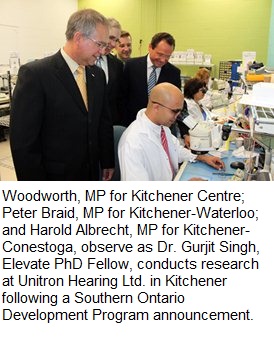Toronto (Sept. 29, 2010) - It's a sad fact that about one in five people with hearing loss stop using their hearing aid—and Toronto Rehab researcher Dr. Gurjit Singh wants to do something about it.
 The mysteries surrounding hearing loss have always fascinated Dr. Singh, who was an audiologist at a hearing clinic before deciding to return to university. "I had all kinds of questions I wanted to answer, such as why is there such variability with success when people use hearing aids?"
The mysteries surrounding hearing loss have always fascinated Dr. Singh, who was an audiologist at a hearing clinic before deciding to return to university. "I had all kinds of questions I wanted to answer, such as why is there such variability with success when people use hearing aids?"
Now a member of Toronto Rehab's Communication Team, Dr. Singh has received a special grant that will advance his research and, he hopes, take away one of the barriers to hearing-aid use. The federal funding is part of Elevate, a new program to keep top PhD holders in Ontario. It's managed by MITACS, a national research network that connects Canadian businesses with the next generation of skilled workers.
Dr. Singh is using the MITACS Elevate grant to study what he describes as a "potentially revolutionary" way of delivering hearing-aid services over the Internet. The new technology ―developed by his industrial partner Unitron Hearing/Sonova Holding AG ―is a breakthrough because it lets audiologists remotely program people's hearing aids.
Currently, getting a hearing aid involves three to four visits to a clinic. "Hearing aids have to be tailored to the individual. On return visits to the clinic, the audiologist fine-tunes the hearing aid," explains Dr. Singh.
But for some people, especially those who have mobility issues or live in remote areas, or even those who simply have heavy demands on their time, return visits can be a real challenge. This may be one of the reasons people discontinue use of their hearing aids―a situation that is "not ideal, given all that we know about the importance of keeping socially active and having networks of support for successful aging," says Dr. Singh.
Unsolved hearing problems also make it harder to prevent and treat many other health problems.
"We need to remove those barriers to hearing-aid use one at a time. And that's where the real power of hearing rehabilitation lies," says Dr. Singh.
In his study, Dr. Singh will look at several issues, including clinical outcomes and the effect of the new remote technology on patient-clinician interactions.
"This new technology by Unitron could potentially revolutionize the way professionals work with their patients, enabling audiologists to connect with people in the actual environments in which they work or live.It won't replace all face-to-face interactions, but there's the potential to greatly improve access for patients and to increase the use of hearing aids."
With this and other recent advances, Ontario has the expertise to be a world leader in the delivery of hearing-related services using telecommunications technologies, says Dr. Singh.
Hearing loss is estimated to directly impact one in 10 North Americans and is currently the third most common chronic condition affecting older people.
Dr. Singh is a postdoctoral student at the University of Toronto, where his academic supervisor is Dr. Kathy Pichora-Fuller, a Toronto Rehab adjunct scientist.
